Small Operators Form Bulk of U.S. Industry
Page 35

If you've noticed an error in this article please click here to report it so we can fix it.
BY far the greatest proportion of commercial vehicles registered in the United States during 1939 were small and privately owned, whilst the largest single group of transport-vehicle owners were farmers, according to an analysis made by the American Petroleum Industries Committee. One out of every four transport vehicles taxed last year was used for the purpose of agriculture and, of the total number of lorries, 92 per cent. had a capacity of two tons or less.
Despite the small size of the machines and the large number in the hands of farmers and other low-income groups, the special highway taxes paid were found to average more than £20 per unit. Taxation from road transport was equivalent to the entire maintenance costs of all State highways. plus one-third of highway-construction costs during the year.
Lorries owned and operated by the railways, including the American Railway Express Agency, numbered 79,332. Although the average American commercial vehicle was driven over 10,000 miles during the past year, more than four out of five trips made were for distances of under 20 miles.
The number of publicly owned vehicles in America has risen ten times as fast in the past decade as have motor registration figures generally, it is reported. Official statistics indicate that there were 31)4,783 publicly owned motor vehicles in operation in 1939, of which 121,270 were owned by the Federal Government, the remainder being the property of states, counties and municipalities. Nearly half a billion gallons of motor fuel were consumed by vehicles in the performance of public duties.




























































